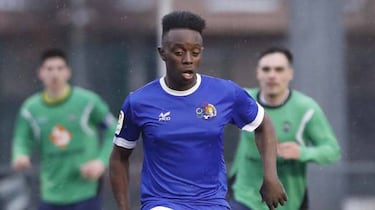Youssouf Diarra and the philosophy of Athletic Club
Alfredo Relaño looks at how Athletic's 'Basque-only' policy has changed over the years, with players now scouted from beyond the traditional territory.</br><a title="Champions League draw live 2017/2018: quarter-finals" href="https://en.as.com/en/2018/03/16/football/1521195188_761651.html">Champions League draw 2018</a>
When I was a lad, Athletic Club beat Di Stéfano’s Real Madrid in the final of the Copa del Rey with 11 Basque players. ‘Eleven locals’ beat the champions of Europe, the team that was already known in the Basque country as ‘The Foreign Legion’, on account of Madrid’s inclination towards non-Spanish players. Jesús María Pereda wore the white shirt of Madrid that day, due to an injury to Paco Gento. Pereda had undergone his footballing education at Balmaseda and Indautxu, yet Athletic Club refused to sign him because he was born in Medina de Polmar. His move to Real Madrid created controversy in Bilbao. Pereda didn’t flourish at the Bernabéu, but he later went on to become a key figure at Barça, and he won the 1964 European Nations’ Cup with Spain. In the final of that tournament, against the Soviet Union, Pereda scored one goal and set up another.
Athletic Bilbao were stricter back in the day
Related stories
These days, Pereda would have no problems playing for Athletic. They now accept players ‘formed’ outside Biscay, in feeder-clubs such as Chantrea, in Pamplona. And their search has now widened beyond the Basque and Navarrese provinces to an imprecise area that includes La Rioja, the west of Cantabria, and the north of Burgos. As the years have passed, the criteria have relaxed. There was once a player called Lázaro Sarabia, who developed his game in Gallarta, just outside Bilbao. He was rejected by Athletic Club because he was born in Torres, Jaén. Yet his brother, Manu, was accepted because he was born in the Basque Country.

Youssouf Diarra the latest case
A few non-Basque players have played for Athletic (Lizarazu was not one of them, he is from the French part of the Basque Country) through lax interpretation of the club’s uncodified rules. In some cases, such as with Laporte and Saborit, Athletic have brought youngsters to their local feeder clubs when they were already footballers. Now, with Youssouf Diarra, we have the same situation once again. Diarra was born in Mali, and moved to Lleida, Catalonia at the age of eight. It was there were he began to play football. He later went to Pamplona, where he played in the youth teams at Ardoi before joining Chantrea, Athletic’s feeder club. A lot has changed since the days of Pereda, and Sarabia.
